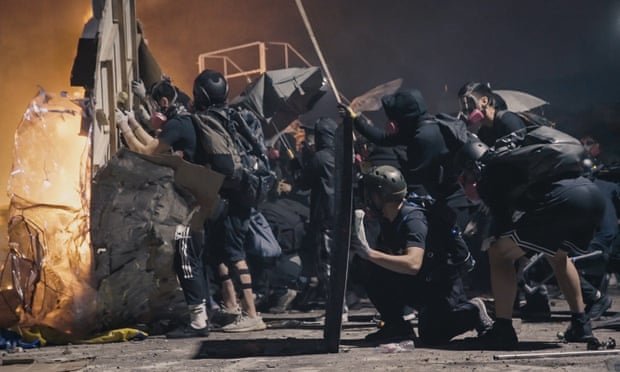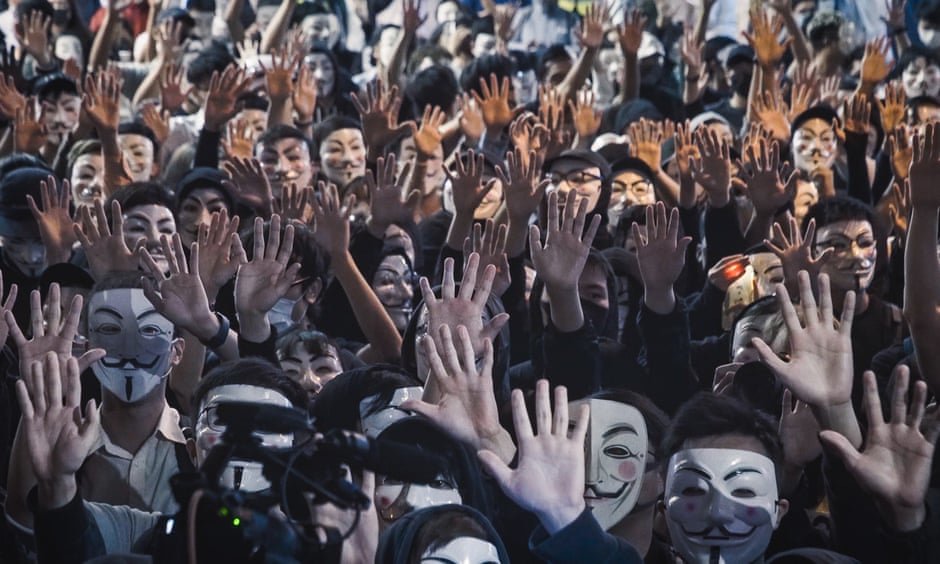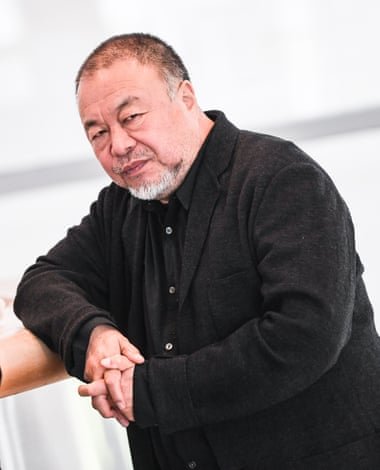
'They are willing to sacrifice everything': Ai Weiwei pays tribute to the Hong Kong protesters
When Ai Weiwei was growing up in China, it was customary for people from the mainland to look down their noses at Hong Kongers. “We thought they had no serious culture. We thought they were colonial subjects only interested in making money and martial arts films. They weren’t political,” the exiled 63-year-old artist recalls over WhatsApp from the back of a car parked in Lisbon.
That childhood view gets turned on its head in Ai’s deeply moving documentary Cockroach, about the Hong Kongers who took to the streets to protest against overweening Chinese rule last year. It’s they who become cultured, utopian and offered political resistance to the mainland’s barbarous clampdown.
Much of the film’s power comes from its meticulous footage of pitched street battles – among them November 2019’s siege of Hong Kong Polytechnic University and the blockade of the Cross-Harbour Tunnel. Ai’s film focuses on the mostly young protesters using all the weapons at their disposal – pavement slabs, molotov cocktails, even cop-distracting laser pointers – to resist Chinese authorities.
It was they who we see in the film cannily applying the “be water” fighting technique of Hong Kong’s most famous son, Bruce Lee, to protest in the streets. Time and again we see them retreating from barricades as police advance with water cannon and teargas, only to re-emerge streets away.

For Ai they are impressive because, while living in one of the most unaffordable cities in the world, they fought not for material improvement but for principles. “They are heroes because they were fighting for democracy and civil society with no real hope that they would achieve their aims. They are clear, well educated and above all sincere.
They were fighting not for jobs or money but things that seem to be abstract. It is about human dignity. I really think I am one of them.”Ai has long been sympathetic to Hong Kong’s struggles for democracy and freedom. When the Umbrella Revolution started in 2015, he tweeted “I am a Hong Konger.” He says: “I was just expressing solidarity but the Chinese authorities thought I was one of the leaders of the revolution and delayed returning my passport.” That suspicion was understandable, because the artist had become an icon of resistance.
“My image was beamed at night on to military buildings,” he recalls. “But even before that I got into trouble by giving a talk at the Chinese University of Hong Kong which the authorities told me was subversive. It was subversive but I was never a leader. What is beautiful about Hong Kong is that their revolution is leaderless. They are resilient because they depend on self-organisation, not rule from above.”
Last year’s demonstrations were provoked by a now-abandoned law that would undermine Hong Kong’s autonomy by allowing extradition to mainland China. Four and a half years after the failed Umbrella Revolution, Hong Kongers demonstrated against Beijing’s betrayal of its “one country, two systems” agreement with Britain, whereby the former colony could keep some unique freedoms for 50 years.
But the demonstrations were about more than that. “These people are unique in the world because they are standing up to China. Most people do not to act. They are too worried about their jobs. Many countries don’t dare stand up to China. But these people are willing to sacrifice everything for their beliefs.”
Ai struggled to get authorities to talk for his film. “Eventually we got two guys in the police who fought in the streets to speak on film. They are honest. They are not proud of what they are doing. But as a job what else can they do?” One of those heavily disguised officers captures the surreal, performative aspect of the street battles when he says: “Who wants to be Lex Luthor?
Everyone wants to be Superman. But this is the script. We have to play a role.” Cockroach, a term used of protesters to express how they are seen as irrelevant by national government, gets repurposed in Ai Weiwei’s film, shouted at police by the protesters from the barricades as if to say it is the authorities that are the real cockroaches.

For Ai, these police and the now aborted extradition law are part of that ugly word used a lot in his film, namely “mainlandisation”. “The Chinese authorities have a lot of money. And even if they didn’t, they would spend it all to maintain stability and control using police and propaganda.
“They have no other way to do it, because they don’t negotiate. They don’t have any tolerance. They don’t give an inch. They simply arrest the people who disagree. This is most effective. I know from my own experience, but they have been controlling like this for 70 years. In my father’s day, one million intellectuals disappeared and nobody knew. Today, terrible things are on the news and nobody cares. I don’t know which is worse.”
Ai’s late father, Ai Qing, a poet, was exiled to Xinjiang during Mao’s Cultural Revolution, where he cleaned communal toilets for five years and, according to his son, lost vision in one eye because of poor nutrition. His poems were not published until after his “rehabilitation” in 1979.
Ai has no doubt that the fate of Hong Kong is to be absorbed into the Chinese mainland, irrespective of the will of its people. “Maybe it will become like Xinjiang or maybe it will become like Shanghai. It won’t become what the protesters hope.”
Few would doubt this analysis. Since the events depicted in Cockroach took place, many of the activists interviewed in Ai’s film – including Joshua Wong, Agnes Chow and Ivan Lam – have been jailed for their roles in the protests. In June, China imposed a national security law. Since then, pro-democracy legislators have been disqualified from elected office and academics have been forced from universities.
Ai moved last September from Berlin to Cambridge so that his 10-year-old son, Lao, could get a better education and be spared the racism he says he experienced in Germany. “I’m happy I left Berlin for a more friendly environment.” He admires Britain for its condemnation of Beijing’s suppression of Hong Kong protesters, and for offering refugees a safe haven. “I think that is a very important gesture. Maybe half a million people would qualify. In the long run it’s really worth it because they are really nice professionals, very well educated, who will appreciate what Britain would do for them.”

So far, fingers crossed, Cambridge is working out for Ai. “I like to talk to people who give you time for explanation, and the British people are patient on that. I need a little comfort. I have had enough harshness in my life.”
That is an understatement. Raised in tough provincial exile, he became as artist and activist an unrelenting critic of the authoritarian regime. As a result he was jailed, refused travel within China and had his passport withdrawn. In 2015 he left his homeland never expecting to be allowed to return.The making of Cockroach was, as a result, a tricky business.
He directed by remote control, sending a team of film-makers along with a journalist specialising in reporting from war zones to shoot in Hong Kong for six months. Later, he worked on the material back in Britain. Will you ever be able to return to China? “I keep the hope but I don’t have any illusions about my chances.” He would like to visit his mother, who is 88, although he talks to her every day.
For all the constraints imposed by exile and pandemic, Ai has been working hard during lockdown. Cockroach is one of three films he completed this year. Vivos, released in January, tells the story of the 43 students who were attacked in Mexico in 2014 and never seen again. Coronation, his portrait of Wuhan during the pandemic, was released to fine reviews in September.
Each of these films bears the hallmarks of Ai’s conscience. He says he became an artist properly only in 2009 when he covered the facade of the Haus der Kunst in Munich with backpacks to spell out in Chinese the following words: “All I want is to let the world remember she had been living happily for seven years.” These were the words a mother told Ai when he investigated the disappearance of 5,335 schoolchildren in Sichuan after the region’s 2008 earthquake.
Why do you make such political works? “I only make films and art about things that fascinate me intellectually and emotionally, I like to understand more. To do that you have to set up some obstacles to overcome. Or get into trouble. That helps you learn.”
• This article was amended on 18 December 2020 because an earlier version said the film was so called because ‘cockroach’ was one of the terms of abuse flung over the barricades at the police. In fact the term was also used of the protesters.










